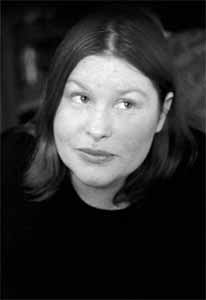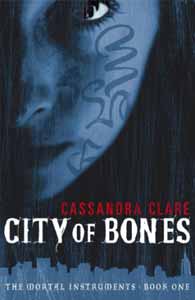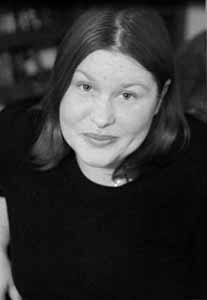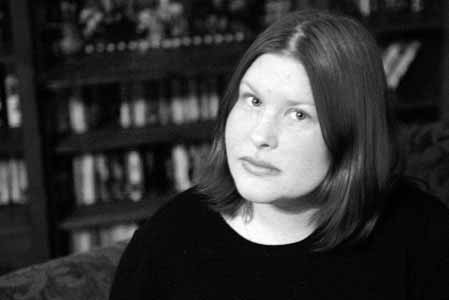|
Cassandra
Clare spent much of her childhood travelling the world with
her family, including one trek through the Himalayas as a
toddler where she spent a month living in her father's backpack.
She lived in France, England and Switzerland before she was
ten years old. She spent her high school years in Los Angeles
where she used to write stories to amuse her classmates. After
college Clare worked at various entertainment magazines and
even some rather suspect tabloids where she reported on Brad
and Angelina's world travels and Britney Spears' wardrobe
malfunctions. Her first professional writing gig was a short
story called The
Girl's Guide to Defeating the Dark Lord
in an anthology of humour fantasy. She also has a short story
published in the anthology So
Fey,
from Haworth Press, and another in the anthology Magic
in the Mirrorstone
from Mirrorstone Books. Charles Packer caught up with Clare
as her first novel, City
of Bones,
was released in the UK...
Charles
Packer:
Most writers can identify the influences on their writing,
who did you admire most and why?
 Cassandra
Clare: I'd say my influences can be pretty clearly drawn back
to what I'd consider the golden age of urban fantasy, when
the genre was being defined by writers like Terri Windling,
Midori Snyder, Charles de Lint, Emma Bull, and Will Shetterly. Cassandra
Clare: I'd say my influences can be pretty clearly drawn back
to what I'd consider the golden age of urban fantasy, when
the genre was being defined by writers like Terri Windling,
Midori Snyder, Charles de Lint, Emma Bull, and Will Shetterly.
I'm also an admirer of the current movement toward a darker,
gritter urban fantasy: the work of Holly Black and Scott Westerfeld
comes to mind.
CP:
You seem to have had quite a bohemian lifestyle, having travelled
across the globe more as a child than most people do in their
adult life. Do you think that this has influenced your writing
and do you still feel like a literary Gipsy?
CC:
It gave me a lifelong love of travel, bordering on an addiction.
I have to travel at least three or four times a year or I
get cranky.
So far this year I've been to Wales, Amsterdam, Belize, and
Guatemala, and I'm planning trips to Jamaica and Iceland.
I
feel like travel detaches you from your normal life just enough
to allow you to really engage with your own imagination. I
do my best writing on the road.
CP:
Although you had experience of writing as a journalist and
in the short story genre, what made you want to take on the
Mortal Instruments trilogy as your first major project?
CC:
The story - really the two main character, Jace and Clary
- came into my head and wanted to be written. I did think:
"This is a big project". But I love reading epic
fantasies and big fat books and so I really wanted to write
one. I think you always write what you want to read.
I sold the trilogy from a proposal and a few chapters, so
it was really a leap of faith on both my part and my publisher's!
CP:
Where did you originally get the idea for the trilogy and
how long did it take you to develop?
 CC:
I got the idea years ago - I was in a tattoo shop in Manhattan's
East Village when the idea came to me that it would be fun
to write about magical tattoos. The characters came just after
that. CC:
I got the idea years ago - I was in a tattoo shop in Manhattan's
East Village when the idea came to me that it would be fun
to write about magical tattoos. The characters came just after
that.
It took about two or three years to develop that into a consistent
magic system and a book.
CP:
I notice that a lot of reviews and the PR blurb are insisting
that you are somehow writing an updated Buffy. Do you
feel that this sort of niche product placement is helpful
for an audience interested in this genre to identify your
book as one of interest or do you think that it denigrates
your efforts to always be compared to something else?
CC:
I don't mind being compared to Buffy - I'm a huge fan.
I can see where you might be concerned that people picking
up the book and expecting something exactly like Buffy
might be disappointed - it's like Buffy in mood, and
in its blending of action and humour, rather than in anything
specific.
I
think that when marketers, who are trying to get the word
out about a book to a big population, look for comparative
language, they look to the world of television and movies
- because, like it or not, many many more people watch TV
and movies than read.
CP:
Although a lot of the major characters were teenagers I personally
thought that the book could be enjoyed by all ages, was there
any pressure to increase the ages to gain a wider audience?
CC:
I'm glad to hear that. I don't necessarily think a book about
teenagers is a book only for teenagers, any more than Dandelion
Wine or A High Wind in Jamaica are only for children
because they're about children. And as we've seen with the
Harry Potter books, adults are increasingly willing to read
books whose protagonists are younger.
Very early on when I was selling the book, I was approached
by a publisher who wanted me to age the characters up and
make the book a romance novel. I thought about it and realised
it wouldn't work - though more from the romance angle than
anything else!
CP:
The book was aimed at a teenage audience, how difficult was
it to pitch both the action and the dialogue at this age group
without falling into the trap of talking down to your audience?
 CC:
I think talking down to your audience when you're writing
YA is a disaster. Kids are not: "like adults, but not
as smart." They are just as smart, they simply have different
concerns. CC:
I think talking down to your audience when you're writing
YA is a disaster. Kids are not: "like adults, but not
as smart." They are just as smart, they simply have different
concerns.
When you're writing YA I think it's good to keep in mind that
you're writing about teens, not "for kids" , and
that you write the book you'd write if you were writing for
adults; it's just that your protagonists are teenagers and
so your book addresses their concerns.
CP:
Most of you characters, including the heroine Clary Fray,
are presented as strong charcters but with flaws. Do you feel
that people's flaws are as important in determining their
destiny?
CC:
Well,
your flaws make you who you are and who you are determines
the choices you make. I think characters without flaws are
no fun - you can't relate to them or put yourself in their
place.
CP:
The
next book in the trilogy is City of Ashes, when does
that come out and what can people expect in terms of the story?
CC:
City of Ashes will hopefully be out in summer of 2008
in the UK. It cranks up the actions a notch - it's about a
spate of murders happening in New York's Downworld, in which
Downworlder children are being killed and their bodies drained
of blood. After all the Silent Brothers are murdered Jace
and Clary and the rest are drawn into the mystery. Oh, and
one of the main characters dies.
CP:
How have you found the experience having your first novel
published? Any dancing in the streets?
CC:
I
think when I initially sold it I was pretty deliriously happy.
But then you realise that your day-to-day life doesn't change
all that much, and what's mainly happened in the past two
years is that I've worked harder than I ever have before in
my life!
I
think I got a grey hair this year. I'm going to name it City
of Glass after the last book in the trilogy.
RG:
Thank you for your time.

With
thanks Ruth Drysdale at Taylor Herring
City
of Bones is released by Walker Books from 02 July 2007.
Click
here
to buy City of Bones for £5.59 (RRP: £7.99)
Return
to...

|